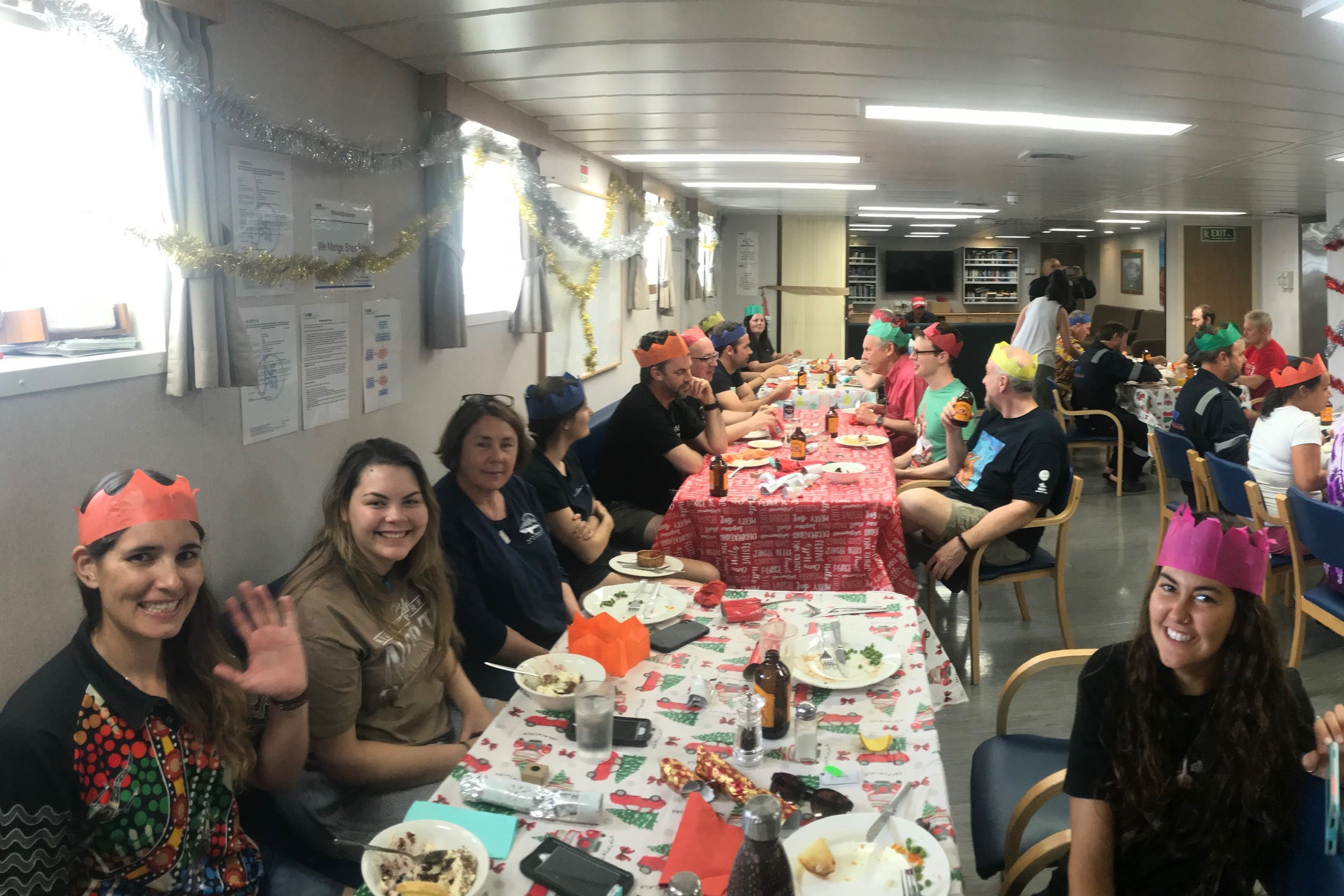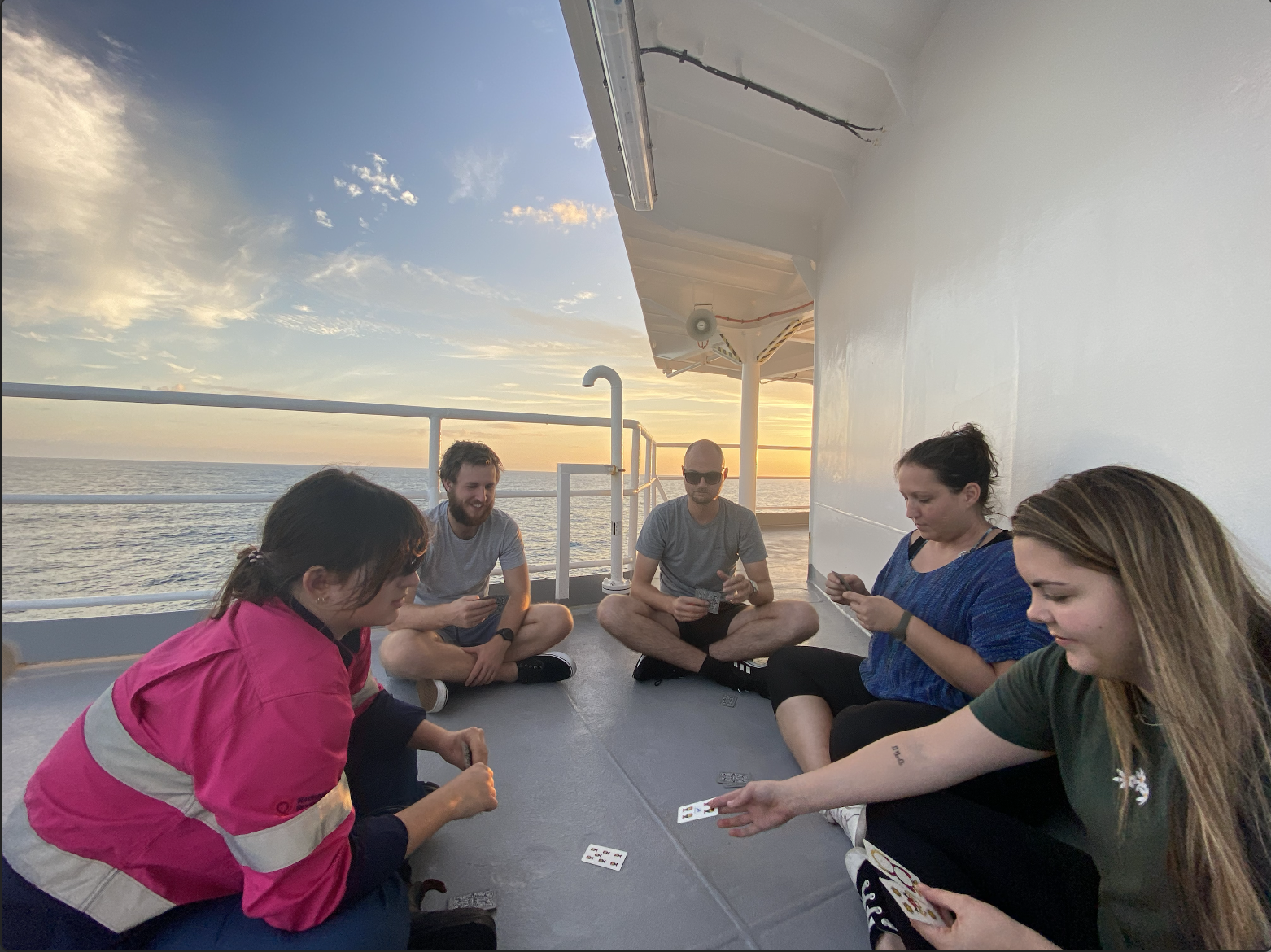Shift work
Science doesn't sleep, but good scientists do
 RV Investigator operates 24 hours a day, seven days a week, commonly with participants on two alternating 12-hour shifts. You can expect to be assigned to a shift prior to a voyage by a Chief Scientist or Voyage Manager.
RV Investigator operates 24 hours a day, seven days a week, commonly with participants on two alternating 12-hour shifts. You can expect to be assigned to a shift prior to a voyage by a Chief Scientist or Voyage Manager.
Cabins are mostly twin share so you will likely be sharing a cabin with someone. Don’t be surprised if you rarely see them though – cabin mates are often on an alternating shifts – meaning only one person will be in the cabin at a time.
Social media
Staying connected
From whale sightings to sharing an amazing sunset – we understand that you’ll want to stay in touch with your family and friends throughout the voyage.
Satellite bandwidth is limited and expensive from the vessel, and while you can access email and social media on board, you cannot send or receive large files (more on that in our ICT Network Usage policy). The MNF has a fair use policy for social media, and it’s also important to think before posting – release of some information can impact on the voyage scientific and communication objectives.
We encourage you to let your family and friends know what to expect before you step on board so that they will have a realistic understanding about your communications.
Sea sickness
Don't panic!
Whether you’re new to sailing or a seasoned traveller, sea sickness can be an unavoidable part of life at sea – even for the crew! Most people take two or three days to adjust to the motion of the ship, so we recommend bringing an adequate supply of sea sickness tablets with you (plus other remedies) to get you through the voyage, just in case you have any issues.
If you are having a tough time with sea sickness during the voyage, there are plenty of people on board who are ready to help.
VIDEO: Immerse yourself in life at sea - without getting your feet wet!
Interpersonal dynamics
Take the pressure down
 Everyone on board a voyage wants to enjoy the experience – and voyages often result in unforgettable memories and lasting friendships.
Everyone on board a voyage wants to enjoy the experience – and voyages often result in unforgettable memories and lasting friendships.
Life on board a ship does require some adjustment though.
Days can be busy, space is limited and you’re working closely with a bunch of new people. Be kind to yourself and others, and allow yourself some time to adjust to ship life – with a positive attitude, challenging situations can be alleviated to the benefit of all on board.
Remember, you’re all in the same boat. Literally! Respect and empathy for your fellow participants will go a long way.
Health and safety
Putting people first
Safety is our number one priority and is the responsibility of everyone on board. We aim to ensure each voyage is safe and successful for all. Even before you step on board, you will have started a program of health, safety and well-being inductions, including managing mental health and wellbeing.
These will continue when you step on board the vessel. It’s important that throughout the voyage, you stay aware of your surroundings and potential hazards. Ensure that you and your fellow participants always follow safe work practices. Seek guidance and advice if you have any concerns or issues.
Just like sea sickness, fatigue can be a factor on a busy voyage – especially with shift work – so once you’re on board, we’ll be helping you keep an eye on your fatigue and manage it accordingly.
Shift work
Science doesn't sleep, but good scientists do
RV Investigator operates 24 hours a day, seven days a week, commonly with participants on two alternating 12-hour shifts. You can expect to be assigned to a shift prior to a voyage by a Chief Scientist or Voyage Manager.
Cabins are mostly twin share so you will likely be sharing a cabin with someone. Don’t be surprised if you rarely see them though – cabin mates are often on an alternating shifts – meaning only one person will be in the cabin at a time.
Social media
Staying connected
From whale sightings to sharing an amazing sunset – we understand that you’ll want to stay in touch with your family and friends throughout the voyage.
Satellite bandwidth is limited and expensive from the vessel, and while you can access email and social media on board, you cannot send or receive large files (more on that in our ICT Network Usage policy). The MNF has a fair use policy for social media, and it’s also important to think before posting – release of some information can impact on the voyage scientific and communication objectives.
We encourage you to let your family and friends know what to expect before you step on board so that they will have a realistic understanding about your communications.
Sea sickness
Don't panic!
Whether you’re new to sailing or a seasoned traveller, sea sickness can be an unavoidable part of life at sea – even for the crew! Most people take two or three days to adjust to the motion of the ship, so we recommend bringing an adequate supply of sea sickness tablets with you (plus other remedies) to get you through the voyage, just in case you have any issues.
If you are having a tough time with sea sickness during the voyage, there are plenty of people on board who are ready to help.
VIDEO: Immerse yourself in life at sea - without getting your feet wet!
Interpersonal dynamics
Take the pressure down
Everyone on board a voyage wants to enjoy the experience – and voyages often result in unforgettable memories and lasting friendships.
Life on board a ship does require some adjustment though.
Days can be busy, space is limited and you’re working closely with a bunch of new people. Be kind to yourself and others, and allow yourself some time to adjust to ship life – with a positive attitude, challenging situations can be alleviated to the benefit of all on board.
Remember, you’re all in the same boat. Literally! Respect and empathy for your fellow participants will go a long way.
Health and safety
Putting people first
Safety is our number one priority and is the responsibility of everyone on board. We aim to ensure each voyage is safe and successful for all. Even before you step on board, you will have started a program of health, safety and well-being inductions, including managing mental health and wellbeing.
These will continue when you step on board the vessel. It’s important that throughout the voyage, you stay aware of your surroundings and potential hazards. Ensure that you and your fellow participants always follow safe work practices. Seek guidance and advice if you have any concerns or issues.
Just like sea sickness, fatigue can be a factor on a busy voyage – especially with shift work – so once you’re on board, we’ll be helping you keep an eye on your fatigue and manage it accordingly.
